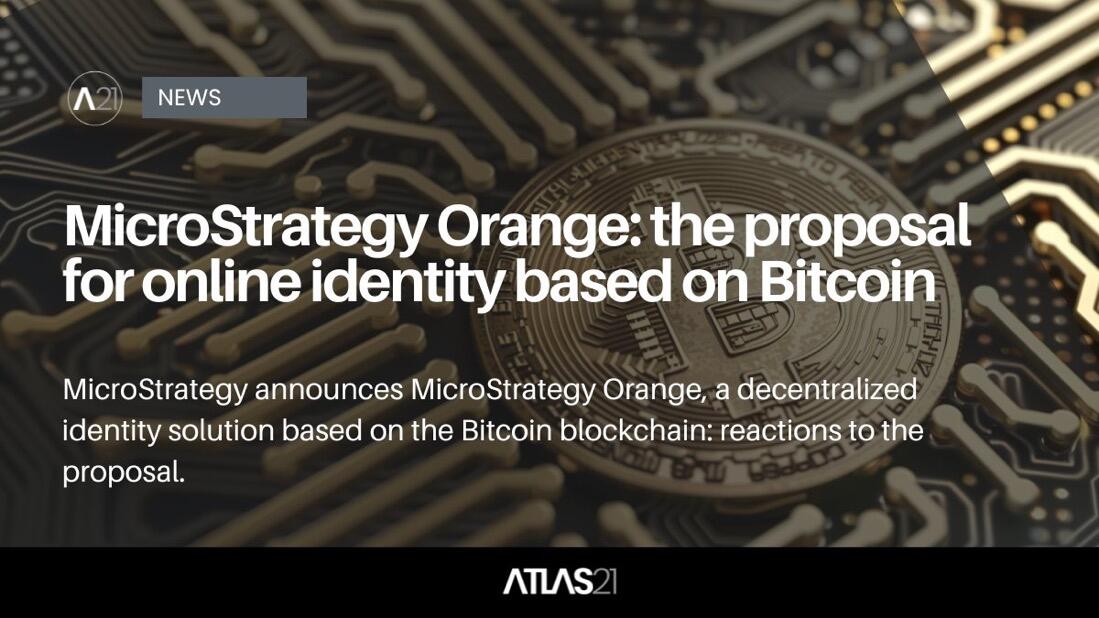BMaxi on Nostr: BITCOIN - MicroStrategy Orange: the proposal for online identity based on #Bitcoin On ...
BITCOIN - MicroStrategy Orange: the proposal for online identity based on #Bitcoin
On May 1st, during the MicroStrategy World 2024 event in Las Vegas, MicroStrategy announced the development of a new open-source solution for decentralized identity management called MicroStrategy Orange. The solution is based on Bitcoin’s decentralized identity (DID) protocol, which utilizes UTXOs to control identities. Decentralized Identifiers (DIDs) are a type of unique identifiers that allow entities to be identified in a decentralized manner, without the involvement of a central authority.
The DID method of inscriptions on Bitcoin (did:btc), used by MicroStrategy Orange, leverages inscriptions embedded in the witness data field to store and retrieve information about DIDs, utilizing UTXOs for DID control.
MicroStrategy Orange provides three main components: the Orange service for organizations wanting to issue DIDs, the Orange Software Development Kit (SDK) for developers, and Orange applications such as “Orange For Outlook,” which integrates digital signatures into emails to verify the identity of the sender.
During the presentation, Michael Saylor stated:
"Wouldn't it be great if instead of a blue check, green check, etc., there was an orange check that was a global standard? With MicroStrategy, maybe we could approach this idea of decentralized identity, with Bitcoin."
According to Saylor, MicroStrategy Orange is capable of processing up to 10,000 DIDs in a single #Bitcoin transaction. The system aims to simplify the adoption of DIDs for organizations and individuals, offering a way to manage online identities securely and pseudonymously.
The community’s thought:
The reactions to the proposal have been mixed. While proponents of the Ordinals and inscription protocol have enthusiastically welcomed the proposal, skeptics have expressed their doubts about it.
@giacomozucco (Giacomo Zucco), director of the Plan B Network project, stated:
"One ID for one UTxO doesn't scale (we need Todd-style single-use-seals). If it did, we would already have: BitAuth, BitID, ION, and other hundreds attempts. Even if another attempt like that was needed, using the term "inscription" or saying that the witness "saves blockspace" is retarded."
@francispouliot_ , CEO of Bull Bitcoin (Francis bullbitcoin.com ), stated:
"Using inscriptions to create digital IDs on Bitcoin is so retarded that I'm not concerned it will go away. Saylor is doing it because BMag [Bitcoin Magazine] people hyped inscriptions as cool and edgy tech.
Its even more dumb then ordinals because at least with ordinals you can do scams."
The @lnp_bp (LNP/BO Standards Association) commented:
"The approach on BTC DID is similar to our SSI, but not that much: MSTR proposal requires to create a bitcoin tx per identity, i.e. it simply won’t scale, would be expensive and not adopted. SSI does not have that limitation."
On May 1st, during the MicroStrategy World 2024 event in Las Vegas, MicroStrategy announced the development of a new open-source solution for decentralized identity management called MicroStrategy Orange. The solution is based on Bitcoin’s decentralized identity (DID) protocol, which utilizes UTXOs to control identities. Decentralized Identifiers (DIDs) are a type of unique identifiers that allow entities to be identified in a decentralized manner, without the involvement of a central authority.
The DID method of inscriptions on Bitcoin (did:btc), used by MicroStrategy Orange, leverages inscriptions embedded in the witness data field to store and retrieve information about DIDs, utilizing UTXOs for DID control.
MicroStrategy Orange provides three main components: the Orange service for organizations wanting to issue DIDs, the Orange Software Development Kit (SDK) for developers, and Orange applications such as “Orange For Outlook,” which integrates digital signatures into emails to verify the identity of the sender.
During the presentation, Michael Saylor stated:
"Wouldn't it be great if instead of a blue check, green check, etc., there was an orange check that was a global standard? With MicroStrategy, maybe we could approach this idea of decentralized identity, with Bitcoin."
According to Saylor, MicroStrategy Orange is capable of processing up to 10,000 DIDs in a single #Bitcoin transaction. The system aims to simplify the adoption of DIDs for organizations and individuals, offering a way to manage online identities securely and pseudonymously.
The community’s thought:
The reactions to the proposal have been mixed. While proponents of the Ordinals and inscription protocol have enthusiastically welcomed the proposal, skeptics have expressed their doubts about it.
@giacomozucco (Giacomo Zucco), director of the Plan B Network project, stated:
"One ID for one UTxO doesn't scale (we need Todd-style single-use-seals). If it did, we would already have: BitAuth, BitID, ION, and other hundreds attempts. Even if another attempt like that was needed, using the term "inscription" or saying that the witness "saves blockspace" is retarded."
@francispouliot_ , CEO of Bull Bitcoin (Francis bullbitcoin.com ), stated:
"Using inscriptions to create digital IDs on Bitcoin is so retarded that I'm not concerned it will go away. Saylor is doing it because BMag [Bitcoin Magazine] people hyped inscriptions as cool and edgy tech.
Its even more dumb then ordinals because at least with ordinals you can do scams."
The @lnp_bp (LNP/BO Standards Association) commented:
"The approach on BTC DID is similar to our SSI, but not that much: MSTR proposal requires to create a bitcoin tx per identity, i.e. it simply won’t scale, would be expensive and not adopted. SSI does not have that limitation."

